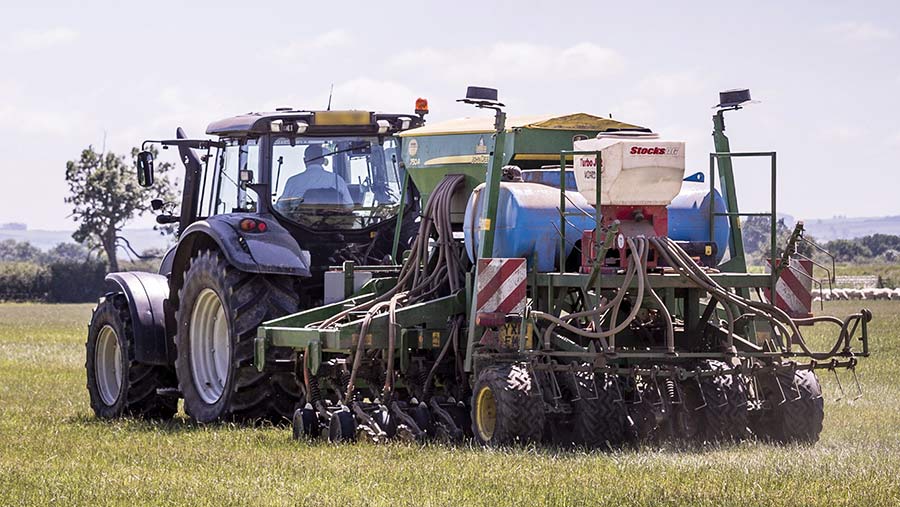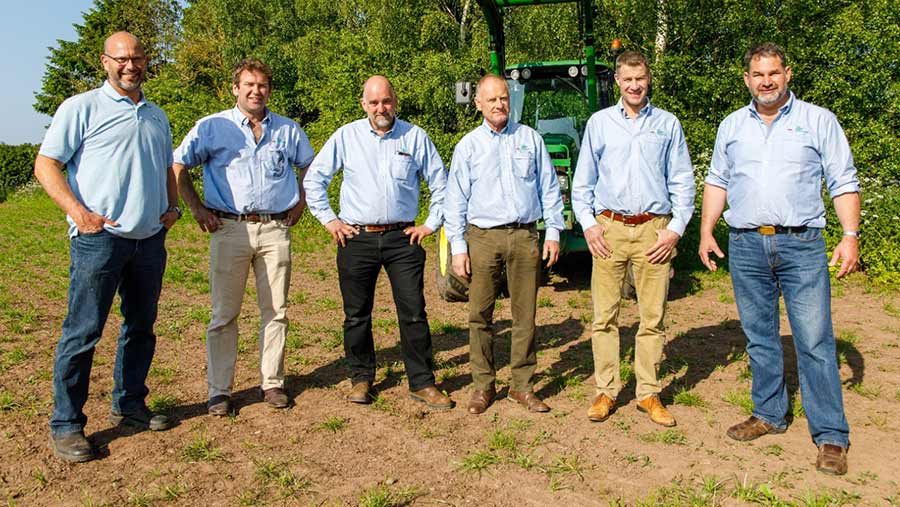How six farmers hope to earn regen farming premium
 © Jim Varney
© Jim Varney Six farmers hope to implement a new assurance standard this September, paving the way to sell regenerative produce under a premium label.
The Green Farm Collective initiative also aims to share knowledge on regenerative farming practices, and trade both carbon and biodiversity at a premium price.
See also: Biological brews help grower keep crop disease at bay
It is currently developing its own set of unique Food Integrity Assurance standards, which will enable the sale of regenerative produce, using the groups’ audited premium label.
Ready for implementation in September 2023, the standard will require membership for a baseline such as Red Tractor or Leaf. Assessment will be delivered via a self-declared checklist submitted by each member.
One of the six founders, Michael Kavanagh, who hosted a recent open day in Shropshire, says: “The Green Farm Collective is a brand created by farmers for farmers.”
The collective is working to the following principles: member knowledge exchange, establishing a premium regenerative food standard, and trading carbon and biodiversity to private companies and individuals.
“We are firm believers of producing regeneratively produced food for a premium price that will benefit human health, soils and the environment,” he says.
Innovation award
The Green Farm Collective has launched a Green Innovation Award.
The £10,000 prize will go to a project that actively contributes to sustainable farming practices.
Competitors must demonstrate how they would implement an innovation on farm, which improves the farming system and has a marked impact on the sustainability of the farm or sees biodiversity improvements.
Membership criteria
Farmers who practise regenerative and nature-friendly farming techniques are welcome to join the collective, alongside ethical businesses and individuals who want to invest in sustainable farming practices and environmental outputs.
However, farmer “suppliers” wanting to join must fit certain criteria before they can become a member.
This includes running a farm business which demonstrates net-zero, certified natural capital credentials, high soil health status, quantified soil carbon verification and operating regenerative practices.
Speaker and honorary member of the collective Patrick Holford has spent 40 years studying human health and endorses the initiative’s regenerative farming methods.
He believes farmers can increase the nutrient value of food by better managing soils, therefore, reducing the amount of food consumers need to eat to obtain nutrition for overall health.
“Research shows that health issues can be solved with correct nutrition. Healthy soil improves food nutrient density, which improves our health and the quality of our lives,” says Patrick.
“My focus now, is on agricultural soils.”
Benefits of membership
An annual active farm business membership costs £250, and provides:
- Access to premium biodiversity and carbon markets through its network of partners, bringing farmers and investors together
- Knowledge and advice from members through a private discussion platform
- A 15% discount on the initial purchase of the software package, Sandy, and 5% thereafter
- Two tickets to the annual open day. Extras at discounted prices
- Quarterly reports – from carbon markets and biodiversity trades to innovative farming ideas
- Access to potential new premium produce markets
- Access to consultation from founding members subject to fees.
Sponsorship membership costs £10/year with access to:
- Quarterly reports
- Farm engagement days
- Bird surveys
- Photo galleries.
Corporate and Individual adviser membership is also available.
Carbon and biodiversity investments
The Green Farm Collective has constructed a carbon package to sell to prospective customers and two further biodiversity bundles that investors can benefit from.
Trinity AgTech’s digital carbon calculator, Sandy, is used to record and generate carbon and natural capital data.
Carbon certificates will be sold on an annual basis, but only if farms are reaching net zero with excess carbon to sell.
Two biodiversity investments will also be available, sold as an annual agreement. Trading of both carbon and natural capital is via Trinity Natural Capital Markets.
The first package is based on in-field biodiversity within the crop.
This ensures farmland is managed sustainably to encourage soil health, in line with the Green Farm Collective farming policy such as adopting no-till and reducing synthetic inputs.
The second package is centred on enhancing biodiversity areas around field margins, hedges, ponds, trees, beetle banks and wildflower areas.
The collective also intends to create crowdfunded projects for the Green Farm Collective community to invest in.
These could include specific wildlife and habitat creation or enhancement and public engagement/education facilities.
Founders of the Green Farm Collective

From left: Jake, Michael, Tim, Simon, Richard and Angus © Green Farm Collective
Jake Freestone
Jake is farm manager at Overbury Farms in the Cotswolds, where he operates a no-till system, with extensive cover crops, in a diversified rotation which integrates sheep. Insecticides are no longer used, and seed dressings have largely been eliminated. He takes pride in using regenerative practices to increase biodiversity across the estate.
Michael Kavanagh
Michael manages a farm in Shropshire, where his focus lies in promoting plant health and minimising artificial inputs. He grows milling wheat, malting barley and quinoa, and runs a flock of 500 ewes. He has not applied insecticides on crops for seven years, helping promote populations of beneficial insects.
Tim Parton
Staffordshire farmer Tim describes himself as a “biological farmer”. He fuels the health of his soils and crops through a combination of home-brewed microbe and fungal mixes and timely micro-nutrient sprays.
He has eliminated synthetic fungicide use and places nutrition at the heart of his crop production strategy.
Simon Cowell
Farming on the east coast of Essex on low-lying land with little natural topsoil, Simon has reduced cultivations for the last 20 years to let soils naturally restructure and build fertility.
He runs a diverse rotation of up to 10 different crops which includes legumes and flowering crops to fix N and provide habitats for pollinators. Resultingly, he has seen a significant cut in artificial chemical and fertiliser use.
Richard Suddes
Richard farms beef and arable with his family in County Durham. His 140-head of pedigree Limousine cattle are fed on grass, silage and a 98% home-grown cereal ration.
The family also run a large free-range egg unit, where artificial fertiliser use for muck has been considerably cut back. Richard plans to completely eliminate fertiliser use in the near future.
Angus Gowthorpe
North Yorkshire beef and arable farmer Angus places soil health at the heart of crop production. He has significantly reduced inputs cost and largely maintained crop yields.
He can now confidently grow crops without synthetic fungicides, insecticides and plant growth regulators.

